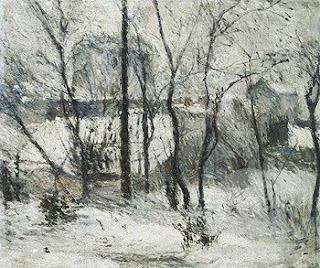AftermathI think by now it is time for the second cutting.
I imagine the field, the one above the last
house we rented, has lain in convalescence
long enough. The hawk has taken back the air
above new grass, and the doe again can hide
her young. I can tell you now I crossed
that field, weeks before the first pass of the blade,
through grass and briars, fog — the night itself
to my thighs, my skirt pulled up that high.
I came to what had been our house and stood outside.
I saw her in it. She reminded me of me —
with her hair black and long as mine had been —
as she moved in and then away from the sharp
frame the window made of the darkness.
I confess that last house was the coldest
I kept. In it, I became formless as fog, crossing
the walls, formless as your breath as it rose
from your mouth to disappear in the air above you.
You see, aftermath is easier, opening
again the wound along its numb scar; it is the sentence
spoken the second time — truer, perhaps,
with the blunt edge of a practiced tongue.
The Spanish LoverThere were warnings: he had, at forty, never
married; he was too close to his mother,
calling her by her given name, Manuela,
ah, Manuela — like a lover; even her face
had bled, even the walls, giving birth to him;
she still had saved all of his baby teeth
except the one he had yet to lose, a small
eyetooth embedded, stubborn in the gum.
I would eat an artichoke down to its heart,
then feed the heart to him. It was enough
that he was not you — and utterly foreign,
related to no one. So it was not love.
So it ended badly, but to some relief.
I was again alone in my bed, but not
invisible as I had been to you —
and I had learned that when I drank sherry
I was drinking a chalk-white landscape, a distant
poor soil; that such vines have to suffer; and that
champagne can be kept effervescent by putting
a knife in the open mouth of the bottle.
© 2005 by Claudia Emerson










